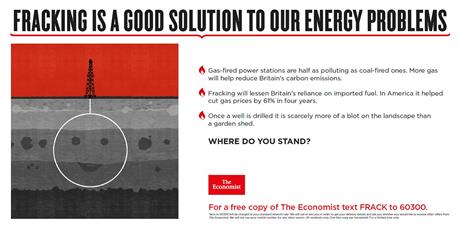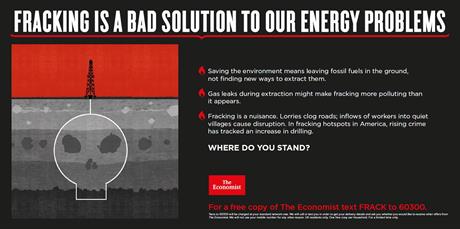On 4 November, 2013, The Economist launched a new burst of its 'Where do you stand?' poster campaign http://www.campaignlive.co.uk/news/1219363/ including the following:


My recollection of the wording was, 'In America it helped cut gas bills by 61% in four years'.
The relevant paragraph from an email received Nov 12, 20013, from David Humber, Complaints Executive of the Advertising Standards Authority:
'While we appreciate your concern regarding the statement “In America it helped cut gas prices by 61% in four years”, we consider that consumers are likely to see the ad as outlining general opinions that some may have about fracking and the viewpoints that they have to support its use (and in the case of the alternative ad, outlining the opinions of those who oppose it’s use). In this way we consider that it’s clear that the ad is demonstrating the kind of debate that could be found in the pages of "The Economist", rather than implying that the claims in the ad are 100% accurate or that it’s making claims about the subject that would require objective substantiation. In the context of an ad for a free copy of a newspaper, we consider that the claim is unlikely to materially mislead people to their detriment and consequently, there does not seem to be a case to answer under the Code on this occasion.'
That day, I replied:
'Dear Mr Humber,
Thank you for your reply. May I draw your attention to that the graph in my original complaint was inadvertently for gasoline. However, the graph for U.S. domestic gas prices, which obviously was what is implied in the advertisement, is here http://www.eia.gov/dnav/ng/hist/n3010us3m.htm and shows:
August 2009: $15.61 per thousand cubic feet
August 2013: $16.46 per thousand cubic feet
I had sent that in subsequent emails which I am not sure were passed on. Can you confirm whether you believe the graph shows a 61% reduction in bills in 4 years due to fracking.
Thank you,'
On 13 November, Mr Humber replied:
'Many thanks for your email.
We had safely received the additional information that you sent through before reaching our decision and we’ve noted the graph that you’ve supplied below. Even so, we do not consider that further action is warranted on this occasion.
We have to consider the ad as a whole, including the context in which a claim appears, to determine whether it’s likely to mislead. We note that in this instance the ad is for a free copy of a newspaper, rather than for fracking specifically and that it’s clear from the context that the claims in the ad are designed to outline the opinion of those who might support its use, rather than providing claims that would be capable of objective substantiation.
Our primary concern is whether a particular claim is likely to materially mislead. In this way we consider that the ad is likely to be seen as suggesting that the newspaper encourages debate on important issues. As the layout and intention of the ad is to provide opposing opinions on a contentious issue, we cannot reasonably argue that a claim made about fracking is likely to encourage a consumer to make a purchase of the newspaper that they otherwise would not have.
Consequently, we do not propose to take further action under our Code on this occasion. I hope this explanation is helpful and thank you again for contacting us.
Kind regards,'
On the 14th, I replied:
'It is reasonable for everyone to believe that you know very well many thousands of people have been misled. Furthermore, the advertisement in Oxford Circus has suddenly been removed - last night. I use L.U regularly and believe the ad must have been put up very recently. I would suggest it is not acceptable to weasel out by only removing the ads.'
There were empty spaces where the fracking advertisment had been. It transpired the fracking advertisment at Charing Cross (and presumably elsewhere) had also been removed. The Economist's other new advertisments (eg Europe, surveilance) remained.
On Nov 20, Mr Humber replied:
'In more general terms it would appear that the claim is based on information provided by the US Department of Energy. Regardless of this, as stated previously, we cannot reasonably argue that a claim made about fracking, in the context of outlining two differing opinions on the subject, is likely to encourage a consumer to make a purchase of the Economist newspaper that they otherwise would not have.
We can’t comment on the removal of the ads as we did not request that they be taken down.'
On 25th, I emailed:
'Dear Mr Humber,
I would be grateful if you could provide a specific reference or link to the information from U.S. Department of Energy.'
I received an automated reply that he was away until 2 December, and would then reply to queries. On 1 December I saw a fracking advertisment facing the platform at Tottenham Court Road. Having received no reply to the request for a reference, or link, on 5 December I resent the message, adding about the fracking advertisment at Tottenham Court Road.
As of 14 December I had received no reply.